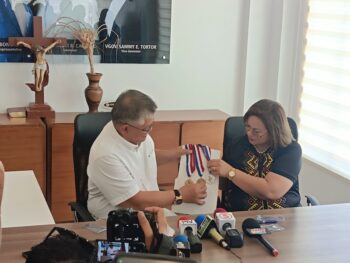Urooj Malik, ADB director for agriculture and environment for Southeast Asia, said sound environmental management should precede any talk of development.
"If we do not protect the environment, it would also jeopardize any investment for development," Malik told reporters from Brunei, Indonesia, Malaysia and the Philippines in a press conference at the sidelines of high level meetings of the BIMP EAGA here.
This as the four EAGA signing ministers agreed that economic growth and environmental management are "inseparable and crucial to sustaining and improving the quality of life and people in EAGA."
The Brunei-Indonesia-Malaysia-Philippines East ASEAN Growth Area (BIMP-EAGA) comprises Brunei, East Indonesia, East Malaysia and Mindanao and Palawan in the Philippines and is home to 55 million people.
The sub-regional grouping adopted the Heart for Borneo terrestrial and the Sulu-Sulawesi Marine Eco region programs to "conserve and preserve" the environment.
Malik noted that 70 percent of the so-called Coral Triangle Initiative in the Sulu-Sulawesi area, home to the biggest and best tuna spawning area, belongs to Philippine territory.
He said precautions have to be made in decisions involving the use of natural resources because these impact on development gains.
He cited as example the denudation of most of South East Asia.
"If we cut down trees, we would affect the watershed. If the watershed is lost, it has impact to the supply of (potable and energy source) water, to the rivers and to the projects in the lowlands such as the millions spent to build dams to secure enough energy supply," he said.
"Everything is interconnected. That is why we need to talk about environment before development," he added.
Asked about the Philippines' international road show to attract investors to its mining industry, Malik said it is important to do it without jeopardizing environmental sustainability.
Malik cited the need for copper, gold and other minerals in developing the region. But government, he said, should ensure it addresses key issues of minimizing damage, proper regulation and technology and environmental governance.
He said capacity building should be pursued to enable governments to ensure careful regulation to avoid fly-by-night mining companies that extract without considering the environmental issues.
"Environmental impact assessments should be carried out," he said.
He also cited the need to factor in the social impact of the projects even if they promise profits and government revenue. He said it is another serious issue that requires careful study.
"We are not here to stop development. Let us just do it right," he said, adding that together with the economic benefits, the environmental safeguards should be in place.
Malik said the framework of "environment and development" popularized in the 1990s starting from the Earth Summit in Brazil's Rio de Janeiro is now obsolete.
Malik's pronouncement came as BIMP senior officials announced a new initiative in the sub-regional grouping this week to focus on their "shared environment."
The senior officials, led by host senior Philippine official Merly Cruz of the Department of Trade and Industry, announced the proposed programs under the Regional Environment Program and called on support organizations to back it.
ADB pledged at least US$1.3 million as its Regional Technical Assistance to an initial 18-month planning phase through intensive stakeholders' participation. (Walter I. Balane/MindaNews)
